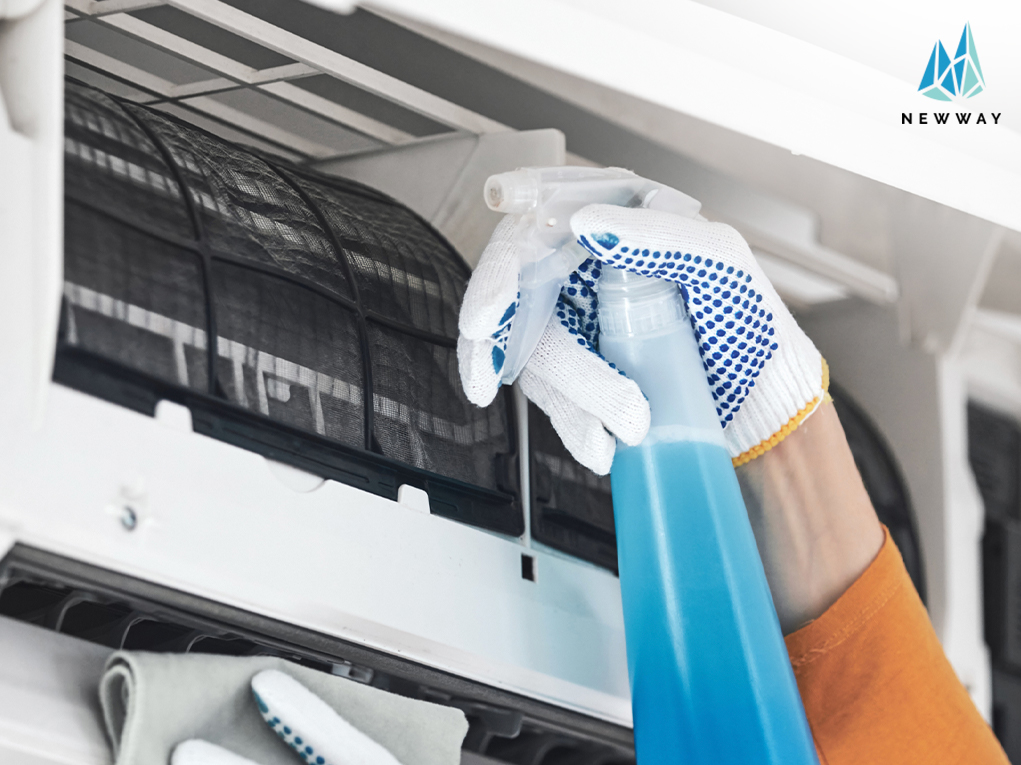
Indoor air quality (IAQ) encompasses various environmental factors within buildings that can impact human health, comfort, and productivity. Although it is a critical aspect of our overall well-being, it often goes unnoticed in our daily lives. In fact, indoor air quality testing is essential for mitigating health risks associated with poor indoor air and plays an important role in creating a healthier, more conducive environment.
According to The National Environment Agency (NEA), poor ventilation increases the risk of airborne infectious diseases, while exposure to pollutants can cause short and long-term health issues such as eye, nose, and throat irritation, as well as respiratory and cardiac diseases. Therefore, effective operation and maintenance of air-conditioning systems should be prioritised to sustain a healthy indoor environment.
Beyond providing cooling in both residential and commercial spaces, air conditioners play a part in improving IAQ by facilitating proper ventilation, diluting indoor pollutants and preventing the buildup of contaminants. However, like any appliance, air conditioning systems experience wear and tear over time, necessitating regular maintenance such as chemical cleaning to ensure longevity. In this article, we will explore how regular aircon service chemical washes help maintain system functionality, contributing to a consistently healthy indoor environment.
UNDERSTANDING INDOOR AIR QUALITY (IAQ)
Definition of Indoor Air Quality (IAQ)
Indoor Air Quality (IAQ) refers to the quality of air within and around buildings and structures, which significantly impacts the health and comfort of occupants. Poor IAQ can expose occupants to health risks, resulting in both immediate and long-term negative health effects.
Factors Influencing Indoor Air Quality
1. Poor Ventilation
Poor ventilation can compromise IAQ, leading to the accumulation of pollutants and bacteria. Common reasons include sealed buildings, which causes restriction in airflow inadvertently when prioritising energy efficiency. Additionally, blocked vents and air filters clogged with impurities can hinder effective air circulation, diminishing the system’s ability to remove indoor pollutants. Moreover, buildings lacking natural ventilation strategies, such as windows and vents that can be opened, further exacerbate improper air circulation.
2. Climate and Weather Conditions
Local climate and weather conditions can impact IAQ, as buildings, even well-sealed ones, still exchange some air with the outdoors through windows, doors, and ventilation systems. This means polluted outdoor air can enter the building and degrade indoor air quality. Worse still, hot climates with stagnant air, pollen, and lack of rain make it ideal for pollutants to infiltrate indoor spaces.
3. Indoor Humidity
High indoor humidity levels in Singapore can encourage the growth of bacteria and mould, diminishing air quality. In fact, Singapore ranks 4th globally among countries with the poorest indoor air quality compared to outdoor air quality.
Therefore, it is recommended to entrust a reliable aircon contractor with installing air conditioning systems to effectively reduce excessive indoor humidity, creating a fresher and more hygienic indoor environment.
4. Chemicals in Building Materials
Certain construction and renovation materials can release harmful particles and chemicals into the air that leads to poor IAQ. For instance, formaldehyde, a cancer-causing chemical noted by NEA, may be emitted from interior paints, composite wood products and adhesives used in buildings. These substances contribute to indoor pollution, deteriorating IAQ and potentially posing health risks to occupants.
5. Other Sources of Indoor Pollution
There are various other sources that adversely impact IAQ. These may include:
- Wood- and coal-powered heating and cooking appliances
- Pet dander and dust mites
- Humidifiers
- Tobacco products and e-cigarettes
- Mould and pollen
- Household cleaners, insecticides, aerosol sprays, and other volatile organic compounds
- Contaminated soil brought indoors
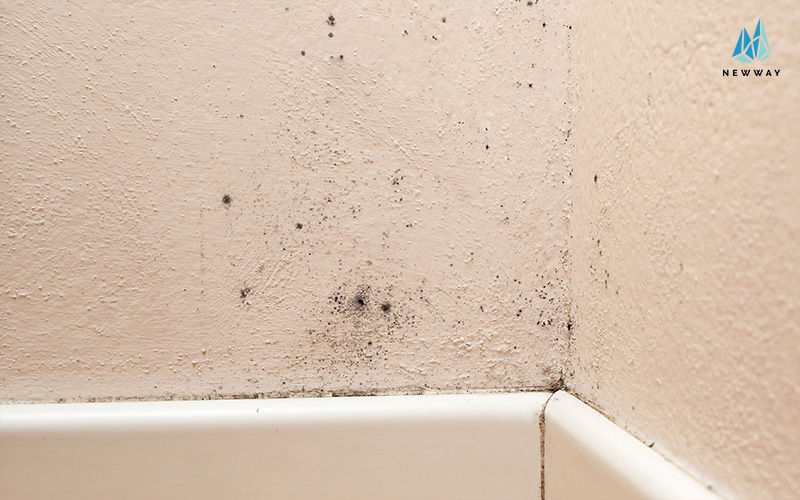
Each of these sources highlights the need for effective ventilation and indoor air quality management in mitigating health impacts and establishing a hygienic environment.
Health Impacts of Poor Indoor Air Quality
Poor IAQ is more than just an inconvenience. In fact, it can pose impacts on occupants’ health in numerous ways, ranging from respiratory discomfort to serious long-term conditions.
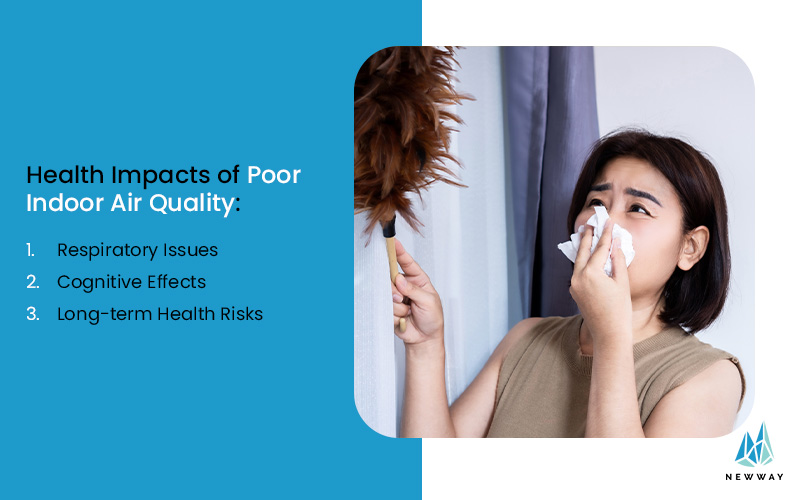
1. Respiratory Issues
Exposure to indoor pollutants can exacerbate respiratory conditions like asthma by irritating and inflaming the airways. For instance, mould spores are known allergens that can trigger allergic reactions and asthma attacks in sensitive individuals, particularly children whose respiratory systems are still developing and more susceptible to these triggers. When exposed to mould, children may experience increased severity and frequency of asthma symptoms. Moreover, research has revealed that higher exposure to indoor pollutants can lead to abnormal lung development and higher rates of infant mortality as well as respiratory infections like pneumonia.
In this context, effective management of IAQ becomes essential. Over time, air conditioners can become breeding grounds for allergens and irritants, especially in humid climates like Singapore. Regular aircon cleaning services help to remove accumulated dust, mould, and other pollutants from the air conditioning system to help maintain healthier indoor air quality.
2. Cognitive Effects
Cognitive performance refers to the brain’s ability to carry out various mental processes, including memory, attention, problem-solving, and decision-making. Indoor air pollutants, such as particulate matter, allergens, and nitrogen oxides, have been linked to impaired cognitive performance in children and adults.
Poor indoor air quality (IAQ) can hinder cognitive functions in several ways. Research has shown that poor IAQ in schools adversely affects children’s health, learning abilities, and academic performance, resulting in lower academic achievement.
Similarly, office workers tend to underperform in environments with high levels of indoor pollutants. A Harvard study found that poorly ventilated workplaces could adversely affect employees’ cognitive performance. Excessive pollutants in the air, such as carbon dioxide (CO2), reduce the amount of oxygen available, which supports brain function. Reduced oxygen levels can lead to fatigue, decreased alertness, and impaired cognitive performance.
3. Long-Term Health Risks
Long-term exposure to indoor pollutants can lead to severe health conditions due to the cumulative effects of inhaling harmful substances over time. Vulnerable groups may encounter higher risks of heart disease and cancer.
- Heart disease
Fine particulate matter (PM2.5), carbon monoxide, and other indoor pollutants can enter the bloodstream through the lungs, causing systemic inflammation and oxidative stress. This can trigger cardiovascular diseases, including hypertension, arrhythmias, and atherosclerosis. The condition may escalate to heart attacks or strokes.

- Cancer
Certain harmful substances like radon and asbestos found in household products and building materials, can damage DNA and lead to the development of various cancers, particularly lung cancer.
Even if immediate symptoms are not apparent, prevention must still be implemented to minimise these debilitating or fatal diseases.
How Air Conditioning Impacts IAQ
Nowadays, more people are becoming increasingly aware that the air they breathe indoors can have profound impacts on their well-being. Poor IAQ not only worsens allergies but also leads to long-term health issues. In contrast, good IAQ enhances comfort and boosts energy levels for occupants, whether at home or in the workplace. This priority has spurred the integration of various features in modern air conditioners aimed at improving overall air quality.
1. Filtration Efficiency
Air conditioners are equipped with filters that capture a variety of particles, including dust, pollen, pet dander, and certain bacteria and viruses. These filters work tirelessly to regulate healthier and cleaner indoor airflow.
2. Humidity Control
Maintaining the right humidity levels guarantees optimal indoor air quality. Excessive humidity can promote the growth of mould and mildew, while low humidity can cause dry skin and respiratory issues. To combat this, many air conditioners come with built-in humidity control features — adjustable settings, integrated dehumidifiers, and smart controls — to extract excess moisture from the air and adjust humidity levels automatically. These capabilities keep the indoor environment hygienic at all times, all while boosting the air conditioning system’s efficiency.
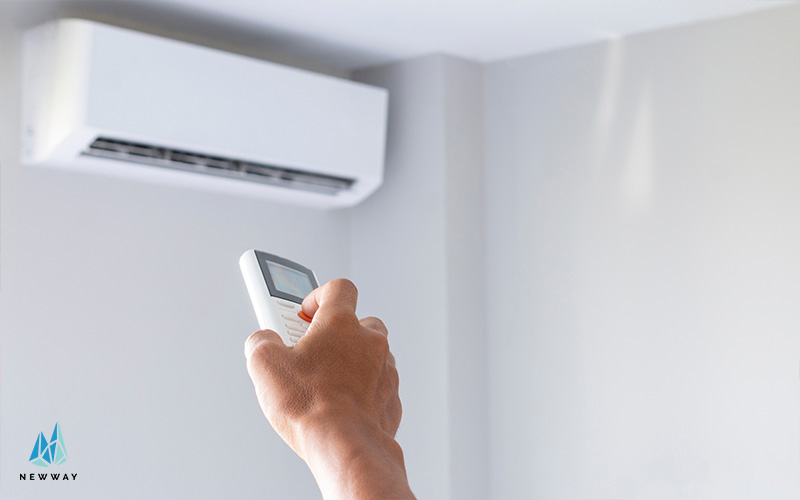
3. Ventilation
Air conditioners circulate air through a filter to effectively remove impurities and pollutants that can compromise IAQ. Modern systems often come with advanced features such as energy recovery ventilators (ERVs), which exchange stale indoor air with fresh outdoor air to provide proper ventilation and the circulation of clean air.
To maintain these filtration and ventilation capabilities, scheduling regular aircon chemical cleaning in Singapore is recommended. This service focuses on eliminating accumulated dirt, dust, and microbial growth in the system to boost its efficiency and maintain high standards of IAQ in indoor spaces.
4. Allergen Reduction
Air conditioners capture dust and pollen to help reduce allergen levels indoors. This functionality can be complemented by integrating it with advanced air purifiers, which specifically target specific allergens and pollutants for thorough cleansing.
5. Odour Removal
The presence of filthy microorganisms like mould and fungi can emit unpleasant odours. An air conditioner can help eliminate them by continuously circulating and filtering the air.
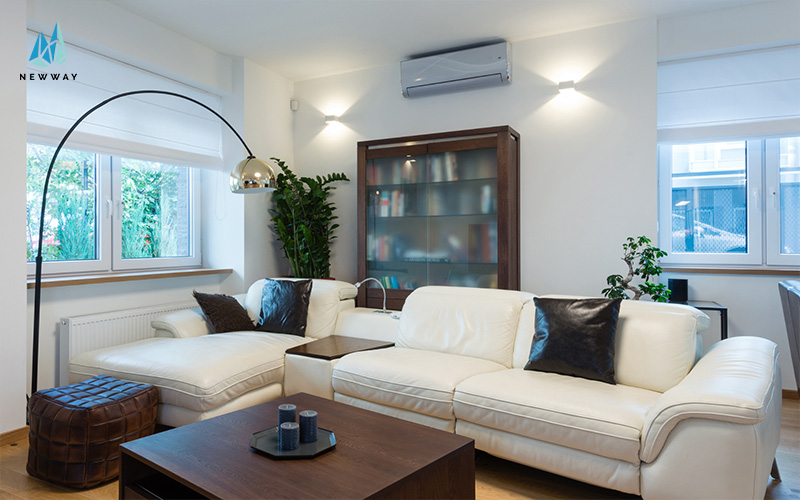
THE ROLE OF REGULAR AIRCON MAINTENANCE
Benefits of Regular Aircon Maintenance
Air conditioning has become a necessity in Singapore’s hot and humid climate. However, as time goes by, the system may experience wear and tear, potentially leading to significant repair expenses for home and building owners. This is where regular aircon servicing comes into play.
Learn more: 4 Benefits of Professional Aircon Cleaning Services
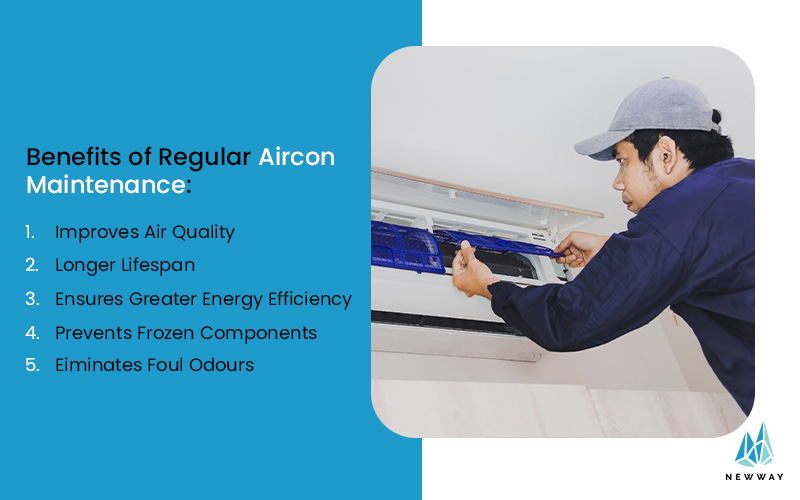
1. Improves Air Quality
Thorough cleaning of internal components such as filters, coils, and ducts during aircon servicing effectively removes dust, dirt, and allergens that compromise indoor air quality. Without these harmful impurities, occupants face lower health risks associated with poor air circulation.
2. Increases Lifespan
It is important to proactively address potential aircon issues before they escalate. Regular servicing, including inspecting underlying problems and replacing any worn-out parts, helps to extend the lifespan of the aircon without incurring costly repairs or causing premature system failures.
3. Ensures Greater Energy Efficiency
A neglected air conditioning unit can accumulate dust, dirt, and debris, obstructing airflow and forcing the system to convert more energy to push air through clogged parts. This drives up electricity bills and speeds up wear and tear in return. That is why regular servicing is important, restoring the unit to optimal efficiency levels.
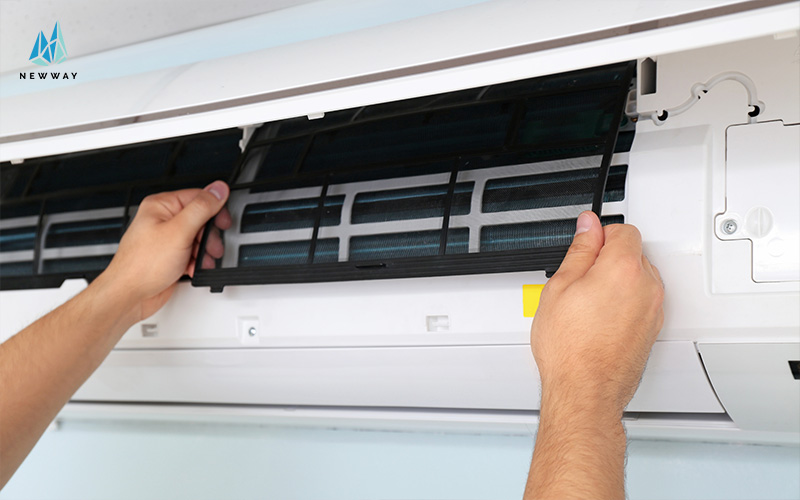
4. Prevents Frozen Components
Aircon servicing includes identifying and rectifying issues like blocked airflow or refrigerant leaks, which can cause components such as the evaporator coil to freeze. Preventing these issues promises uninterrupted cooling performance and reduces the likelihood of damage to the system.
5. Eliminates Foul Odours
Over time, mould, mildew, and bacteria can accumulate within the air conditioning system, leading to unpleasant odours. During professional maintenance and disinfection, technicians use specialised equipment and cleaning agents to thoroughly clean evaporator coils, drip pans, and other components of the air conditioning system. If necessary, aircon chemical wash may be utilised to dissolve stubborn debris and microbial growth, ensuring a fresh and pleasant indoor environment for occupants.
The Role of Aircon Chemical Wash in Maintaining Good IAQ
Standard aircon servicing may not always suffice in promising a well-functioning system, particularly when issues like mould and bacterial buildup persist. In this case, aircon service chemical washes serve as a better alternative, contributing to improved IAQ and overall comfort for all occupants.
1. Removal of Contaminants
During an aircon service chemical wash, HVAC technicians use specialised cleaning agents to remove dust and microbial buildup in the system. They first dismantle the unit to access the coils and then apply the chemical solution using a spray. The solution breaks down the accumulated dirt, mould, and bacteria. After allowing it to sit for a few minutes, the technician rinses off the coils with water, washing away the contaminants. This thorough cleaning process ensures that the aircon functions in tip-top condition.
2. Prevention of Mould and Bacteria Growth
Chemical washes incorporate biocidal agents that effectively kill and remove harmful microorganisms like mould and bacteria. The key is to prevent them from circulating in the indoor air and safeguard occupants against respiratory issues and allergies.
3. Cleaner Evaporator Coils
The evaporator coils in air conditioning units are particularly prone to capturing dirt and debris over time, possibly impairing the system’s efficiency by compromising its heat transfer functions. Aircon service chemical washes provide an in-depth cleanup of these coils, eliminating impurities to maintain optimal heat exchange efficiency. This contributes to lower energy consumption and reduced utility bills.
Learn more: How Regular Aircon Servicing Helps With Achieving Energy Efficiency
Additionally, clean coils prevent the system from overworking, reducing the risk of breakdowns and extending the overall lifespan of the air conditioning unit. Regular chemical washes not only enhance performance but also promote a healthier indoor environment by ensuring that the air circulated is free from contaminants.
Frequency of Aircon Chemical Washes
Determining the ideal frequency for aircon chemical washes in Singapore requires consideration of factors such as usage intensity, environmental conditions, system age, and manufacturer recommendations.
As aircon units age and accumulate more debris, the optimal frequency for washes increases. Older units may need professional servicing every two months to maintain clean coils and proper airflow.
HVAC experts generally recommend scheduling a chemical wash every 6 to 12 months, depending on the condition of the system and frequency of use. However, units that operate extensively or are located in dusty, polluted environments may require more frequent cleaning, potentially every 2 to 3 months. Be mindful to perform this maintenance before peak cooling seasons including monsoon rains, when the system experiences the most use.
Remember to check the user manual for manufacturer-recommended timelines and consult with professional aircon servicing companies to tailor the wash schedule to specific usage, environment, and unit age.
Learn more: When Does Your Aircon Need a Chemical Wash?
3.4 Questions You May Have
1. How long does an aircon overhaul take?
The duration of an aircon overhaul depends on the complexity of the system and the extent of the issues. Generally, it can take a few hours to a full day to complete.
2. Can I perform a chemical wash or overhaul myself?
While some basic maintenance can be done by homeowners, chemical washes and overhauls should be performed by trained HVAC professionals to ensure safety and effectiveness.
3. How much does a chemical wash or overhaul cost?
The cost varies based on the size and type of your air conditioning unit and the service provider. On average, a chemical wash is less expensive than an overhaul, which involves more extensive work and potential part replacements.
All in all, regular maintenance tasks like aircon cleaning services are crucial for keeping air conditioning systems running smoothly and efficiently while also improving indoor air quality. Investing in proper maintenance now can prevent costly repairs and prolong the lifespan of your AC unit. By conducting routine maintenance, you can detect and address minor issues before they escalate, saving on potential repair expenses. Additionally, a properly maintained aircon improves energy efficiency, leading to reduced utility bills over time.
If you’re uncertain about the maintenance your aircon requires, professional technicians at Newway can assess your system and recommend the most suitable maintenance approach. Our team has been enhancing the cooling experience for both residential and commercial air conditioning customers since 1987, by offering chemical wash, repair, troubleshooting, and aircon cleaning in Singapore.

